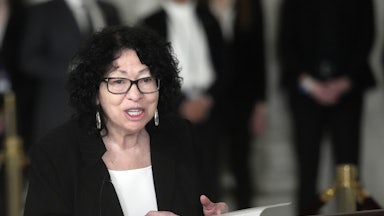The first day of a Supreme Court confirmation hearing is usually the weirdest one. The senators each get 10 minutes to publicly confirm their views on judicial nominees, and the nominee gets to sit there, hearing it. These opening statements usually set the tone for the rest of the week. For Democrats, theirs were full of praise for Jackson’s record and joy at her nomination. For Republicans, who lack a clear path to potentially derail Jackson’s prospects, it was more of a grab bag of complaints with a hefty dollop of culture warmongering.
Most of the Republican senators spent their time rehashing old grievances about the confirmation process. “There are a number of dark money groups on the left that argue federal judges should make policy decisions based on the judges’ own values,” Iowa Senator Chuck Grassley, the committee’s senior Republican, claimed in his opening statement. “I’ve talked about the troubling role far-left dark-money groups like Demand Justice have played in this administration’s judicial selection process.”
It will probably come as no surprise that the longtime Iowa senator had previously expressed no similar concerns when the Trump White House effectively outsourced its judicial nomination process to conservative legal activists like Leonard Leo and the Federalist Society, nor when Supreme Court nominees from Republican presidents received support from a deluge of dark-money donors. Right-wing activist groups planned to spend around $30 million on Justice Amy Coney Barrett’s confirmation battle alone in 2020. But hypocrisy is a bipartisan habit during Supreme Court confirmations, and it would be strange if nobody indulged in it.
Other Republican senators took the chance to highlight their own constitutional views instead of trying to directly attack Jackson’s own. Texas Senator Ted Cruz wondered whether a hypothetical justice would “vote to defend your Second Amendment rights to keep and bear arms” or “roll over to the Democrats that want a disarmed citizenry.” Arkansas Senator Tom Cotton declared that he was “looking for a justice who will protect the right to life of innocent infants,” referring to the court’s abortion rights jurisprudence.
Many of the GOP senators used the opportunity to revisit more heated confirmation battles of the past. There were standard references to the Robert Bork saga of 1986, as well as lower-profile battles over some of George W. Bush’s nominees to the D.C. Circuit Court of Appeals. But most of them spoke extensively about the Brett Kavanaugh confirmation process, which had a searing impact on senators from both parties who served on the Judiciary Committee at the time.
“We will conduct a thorough, exhaustive examination of Judge Jackson’s record and views,” Grassley asserted. “We won’t try to turn this into a spectacle based on alleged process fouls. On that front, we’re off to a good start. Unlike the start to the Kavanaugh hearings, we didn’t have repeated, choreographed interruptions of Chairman Durbin during his opening statement like Democrats interrupted me for more than an hour during my opening statement at the Kavanaugh hearing.”
Cruz assured Jackson that nobody would ask about her “teenage dating habits,” an oblique reference to Christine Blasey Ford’s allegation of sexual assault against Kavanaugh. “Most of us couldn’t go back to our offices during Kavanaugh without getting spit on,” South Carolina Senator Lindsey Graham recalled. “Engaging in the politics of personal destruction is not something we should ever aspire to,” Utah Senator Mike Lee claimed, referring to fellow Republican members of the committee.
But not every Republican senator appeared to be on the same page as Lee. Missouri Senator Josh Hawley signaled last week that he would question Jackson’s record on child-sex crimes. He suggested that she was too lenient on such offenders, both during her policymaking tenure as a member of the U.S. Sentencing Commission, as well as during her time as a federal trial judge handing down sentences to defendants charged with child porn–related offenses. That led to a furious pushback by the Biden White House as well as legal commentators, who suggested that Hawley was making a veiled nod to QAnon conspiracy theories.
Do Hawley’s claims hold up to scrutiny? Not when they’re placed in context. It’s true that Jackson handed down sentences to defendants charged with child porn–related crimes that fell below the nonbinding federal guidelines. At the same time, her sentencing record fit those of other federal judges who handle similar cases. National Review’s Andrew McCarthy, a conservative legal writer who previously served as a federal prosecutor for two decades, described Hawley’s accusation that Jackson was soft on child-porn defendants as “meritless to the point of demagoguery.” And he noted that Jackson’s opposition to a particular mandatory-minimum sentence for reception and distribution was shared by “plenty of hard-nosed prosecutors and Republican-appointed judges” because it was out of sync with similar crimes and related offenses.
Other criticisms focused on questions she had asked during Sentencing Commission hearings. Hawley threaded excerpts of her questions together to give the appearance that she was extremely lenient toward child-sex offenders. But a more thorough review of those transcripts—and her quotes in particular—show that she was asking witnesses about their own research. Hawley took her attempts to get clarification on their arguments as arguments that she herself was making. And it’s worth noting that the commission’s eventual final report had bipartisan support from liberal and conservative members alike. Hawley’s only retort to that point, given in a statement to The Washington Post, was that “they probably shouldn’t be on the Supreme Court either.”
The only senator who went further than Hawley to smear Jackson was Tennessee’s Marsha Blackburn. In her 10-minute opening statement, she attempted to foist nearly every right-wing culture war grievance onto Jackson’s shoulders: trans student-athletes, Covid-19 mandates, perceptions of rising crime, critical race theory, and more. She repeatedly insinuated that Jackson had some sort of deceitful plan to harm Americans. “I can only wonder what’s your hidden agenda,” she asked Jackson. “Is it to let violent criminals, cop killers, and child predators back to the streets?”
While some Republican senators recognized the historic nature of Jackson’s nomination, Blackburn took a different approach to discussing race during the hearing. “You have praised the 1619 Project, which argues the U.S. is a fundamentally racist country, and you have made clear that you believe justices must consider critical race theory when deciding how to sentence criminal defendants,” the Tennessee senator claimed. “Is it your personal hidden agenda to incorporate critical race theory into our legal system?” Jackson did not get a chance to respond to Blackburn’s question.
These points appear to be drawn almost verbatim from a GOP talking-points memo on Jackson and CRT. In a 2020 lecture on Black women in the civil rights movement, Jackson did describe the work of legal scholar Derrick Bell and The New York Times’ 1619 Project. The most that the memo could muster on Bell is that Jackson said her parents owned one of his books. And though Blackburn describes the 1619 Project as arguing that America is a “fundamentally racist country,” Jackson only noted that the project had the “provocative thesis that the America that was born in 1776 was not the perfect union that it purported to be, and that it is actually only through the hard work, struggles, and sacrifices of African Americans over the past two centuries that the United States has finally become the free nation that the Framers initially touted.”
As for the sentencing of criminal defendants, Jackson did not call for critical race theory’s incorporation into sentencing, as Blackburn and the memo claimed. She merely stated that it was a preexisting force in sentencing considerations. The GOP memo claims that Jackson gave a lecture in 2015 where she “said she tries to ‘convince’ her students that sentencing ‘melds together myriad types of law,’ including ‘Critical Race Theory.’” This is a deeply misleading quotation. “I always try to convince my students that sentencing is just plain interesting on an intellectual level, in part because it melds together myriad types of law—criminal law, of course, but also administrative law, constitutional law, critical race theory, negotiations, and to some extent, even contract [law],” Jackson actually said.
In other words, Jackson was being descriptive, not prescriptive. Trying to make sentencing policy sound more interesting to skeptical law students is not the same thing as promoting whatever it is that the GOP thinks critical race theory is in actual sentencing. And her neutral statement that critical race theory plays a role in sentencing policy is unambiguously true. If it weren’t, Congress wouldn’t have spent so much time wrestling with the disparity between crack-cocaine sentences and powder-cocaine sentences over the last decade. Earlier generations of lawmakers created the disparity based on racist assumptions about which groups were more likely to use each type of cocaine. If Blackburn has any questions about it, she could ask fellow Republicans on the Judiciary Committee who have backed bipartisan reforms to fix those disparities.
Jackson, for her part, did not adopt a defensive posture when she finally gave her own opening statement on Monday afternoon. She appeared indefatigably upbeat when thanking her family and her professional mentors, even though her remarks immediately followed Blackburn’s barrage. “During this hearing, I hope that you will see how much I love our country and the Constitution, and the rights that make us free,” she told the senators. “I stand on the shoulders of many who have come before me, including Judge Constance Baker Motley, who was the first African-American woman to be appointed to the federal bench and with whom I share a birthday. And like Judge Motley, I have dedicated my career to ensuring that the words engraved on the front of the Supreme Court building—‘Equal Justice Under Law’—are a reality and not just an ideal.”
What was striking about the whole ordeal wasn’t that Hawley and Blackburn engaged in their attacks. It was that few of their fellow Republicans appeared eager to embrace them. Maybe it’s because they realize the attacks aren’t as merited as their proponents claim. Maybe it’s because they know the stakes are lower this time with a 6–3 conservative majority already secured on the Supreme Court. Maybe they were simply waiting to see if the accusations got any momentum before running with them. Either way, we’ll get to see how much further they’re willing to go—and how Jackson herself responds—when senators start their formal questions to her on Tuesday.










